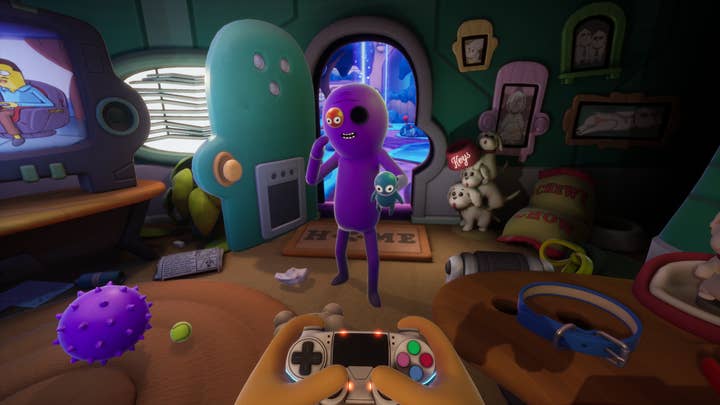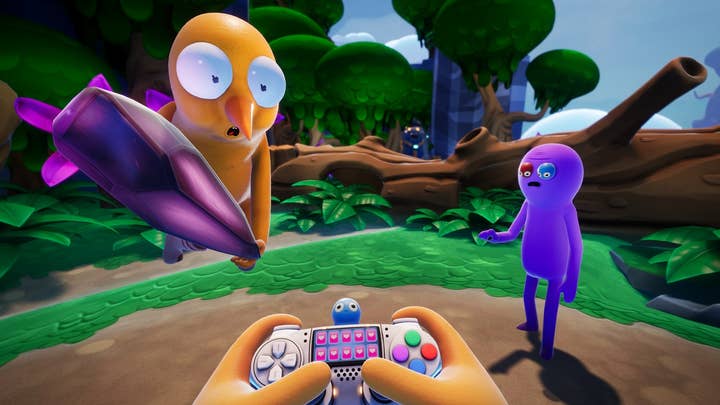Squanch Games shelves VR focus for now
CEO Tanya Watson still believes in the tech but says it's not yet sustainable for the Trover Saves the Universe studio
Squanch Games is dropping its focus on VR, at least temporarily.
Speaking with GamesIndustry.biz this week, Squanch Games CEO and co-founder Tanya Watson confirms that some four years after announcing itself as a VR studio, the company is now primarily working on a dedicated "traditional screen experience."
Watson says the studio plans to work with VR and AR in the future, but the near-term strategy changed as it worked on its most recent game, Trover Saves the Universe.

"About halfway through Trover, we were doing a lot of things specifically with Trover Saves the Universe that were designed from the ground up for VR, but we were playtesting outside of VR because it's quicker to iterate when you don't have to stick a headset on and do a whole thing. We realized it having a conversation with the team. The game still works pretty well outside of VR, and we were just like, 'Does it make sense to bring it to a traditional screen experience?'
"And that's where the lightbulb went off for [studio co-founder and Rick and Morty co-creator] Justin [Roiland]. Because he was very focused on the way he would want to do humor, tell stories, and create characters in VR. Then he realized he can do that in regular games as well. That was a pretty big turning point, and that was when we decided, 'Hey, our studio is built with really amazing game developers that want to make experiences in traditional as well as in VR, so why not open us up to being focused as well in traditional?'"
Trover Saves the Universe was ultimately released across the spectrum of VR headsets and consoles. Watson says the game did "extraordinarily well" for a VR title and had more than half its sales come from VR platforms.
"We're super happy with our sales on the VR side, knowing the audience size, knowing there just aren't as many headsets as there are PCs and consoles," Watson says, "We knew that would be limiting but we didn't really care because we wanted to make this super great experience for VR."
"Because the VR market is still the size it is, it doesn't necessarily sustain these larger game experiences"
That said, she acknowledged it's not currently sustainable to create VR-exclusive games like Trover with a development team of about 16 veteran developers from a AAA background.
"Our number one goal for Trover was to make a fully fledged game for VR, a linear, single-player experience that made you feel like, 'This is 6-8 hours, something I'm going to play over multiple sittings and can maybe enjoy an hour or more at a time, and it has to be the quality level we all wanted to hit,'" Watson explains. "And frankly, that's just expensive. You can't make that game for a few hundred thousand dollars. And because the VR market is still the size it is, it doesn't necessarily sustain these larger game experiences."
It's still possible to make money in VR, she says, but right now the games either have to be fairly small or benefit from external support and investment, like the kind a platform holder might provide.
So how long does she expect it to take for the VR market to become sustainable for the kinds of projects Squanch Games was founded to create?
"Four years ago, I would have said three to five years from then," she says, laughing. "So we're there now. So I'm going to say the same answer: three to five years from now. In three years, especially seeing as the Quest has been such a popular device and seeing how well they can continue to grow that market... If we get to that point where we're seeing 10 to 20 million people with headsets, it seems a lot more feasible for game developers to make these larger, high quality experiences for headsets. That's where it makes sense, budget-wise. Otherwise it's just too much of a risk."
Of course, there are always exceptions, and she points to Beat Saber as perhaps the most notable one in the VR space to date.
"They've made tons of money in the VR space, but there are far fewer [success stories like] those," she says. "There are very few of those. Maybe there's only one of those, and it's only Beat Saber. So as that market size gets bigger, there will be more opportunities for other companies to succeed within it."
"A lot of people have heard of it but then they say, 'Well I don't have a VR headset so I didn't buy it.' And then you say they can get it in non-VR and their response is, 'Well it was made for VR...'"
While Watson is clearly still a believer in the promise of VR, she doesn't seem interested in pursuing a Trover-like model of development in the future, creating games that use VR, but only as an option. Part of that steams from a belief that the best games come from bespoke design for the way in which they'll be played.
"Just like with mobile, when you design a game you're making all these assumptions about where the hands are going to be and what kind of player you have and when they might be playing it," Watson says. "We feel that way about VR. Whatever we decided to do with VR in the future would be VR focused."
On top of that, Watson says there's a marketing problem for games that support both VR headsets and traditional screens, which became clear when Squanch asked potential customers about Trover Saves the Universe.
"A lot of people have heard of it but then they say, 'Well I don't have a VR headset so I didn't buy it,'" Watson says. "And then you say they can get it in non-VR and their response is, 'Well it was made for VR, so I don't want to buy something that wasn't made for the thing that I have.'"
Watson acknowledges part of that came from the game's initial marketing as a VR-exclusive title and the mid-development decision to make it support traditional screens as well, but she agrees it's probably inevitable that a game supporting both will have a certain percentage of customers thinking one version or the other is a compromise or an afterthought.
So for now, at least, Squanch Games is developing traditional screen experiences. And while the format the studio works with has changed, Watson suggests the actual goal is the same as ever.
"What happened with us specifically is that we started building something that was exciting," she says. "We weren't sure where it would go when we started Squanch, but the people we brought in are just so incredibly talented. The people we've been working with, like Justin's friends and family, are so incredibly talented that we have these opportunities that extend well beyond just VR. We felt it almost wasn't fair in a way to keep that stuff just on the VR platform when the potential group of people who could enjoy it was so much larger."

